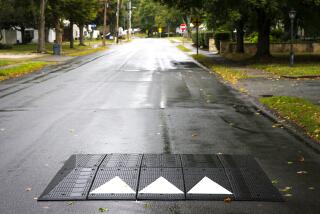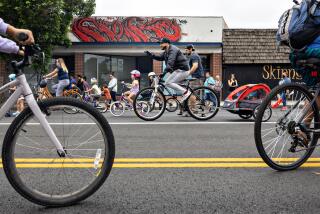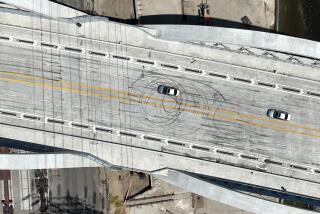L.A. considers lifting 30-day impound on cars of unlicensed drivers
A new policy that would allow unlicensed drivers, including illegal immigrants, to avoid having their cars impounded for up to 30 days is in the process of being finalized but first will be subject to community input and Police Commission review, Los Angeles officials said Tuesday.
Mayor Antonio Villaraigosa has been working closely with the Los Angeles Police Department to develop a policy that should be ready by January, said spokesman Peter Sanders.
“The policy is still in draft form,” Sanders said. “I imagine it could very well change. We’re going to balance the needs of the community and the desires of the community versus public safety, which is paramount.”
The department earlier this year began allowing unlicensed drivers at sobriety checkpoints to avoid having their car towed if a licensed driver was available to take it. Activists have long complained that police are increasingly punishing illegal immigrants who cannot get driver’s licenses by towing and impounding their cars.
The new policy would be expanded to include traffic stops and reduce the number of 30-day holds, which can result in hundreds of dollars in fees. Some vehicle owners could be eligible to retrieve their vehicles after one day, officials said.
The proposed policy already has come under fire by the Los Angeles Police Protective League and others who said it breaches state law and threatens public safety.
“The Mayor’s directive against putting 30-day vehicle holds on first-offense unlicensed drivers puts politics above public safety,” the union group said in a statement. “This new policy will result in innocent people being injured and killed.”
LAPD officials said no final decisions have been made on specific changes.
But the policy would be in line with recent court decisions, which say that impounds should be done under the “community caretaking doctrine,” Assistant Chief Mike Moore said. That means cars can be seized only in certain instances, such as if they pose a threat to public safety or impede traffic.
Any proposed policy changes would be reviewed by Chief Charlie Beck and the Police Commission with input from various community groups, Lt. Andy Neiman said.
“The process is well underway and we look forward to making recommendations in the near future,” he said. “Our intention is to uphold the laws and do our best to address public concerns while still ensuring public safety.”
Villaraigosa announced the new policy in an interview this week with La Opinion.
“I want this to be one of the many things that I have done to extend the notion that the United States is a great place and that we should honor our history by welcoming people and bring [the undocumented] out of the shadows,” he told the newspaper.
Last week, members of the National Lawyers Guild, the Southern California Immigration Coalition and their supporters released a report accusing the Police Department of due process violations, racial profiling and using pretextual stops to target immigrant drivers.
The groups have been monitoring checkpoints for several months and found the new guidelines weren’t always applied, lawyer Gilbert Saucedo said.
The groups also set up a free legal clinic for people whose vehicles were subject to 30-day impounds. They received 300 calls in the first two weeks, according to the report.
Cynthia Anderson Barker, an attorney who helped prepare the report, said she was encouraged to know about coming changes but that an end to 30-day seizures should come sooner than January.
California law allows agencies to impound a car for 30 days if it is driven by an unlicensed driver. Enforcement and subsequent fees vary by jurisdiction, but typically a driver pays a release fee to the agency — which in many cities runs about $100 or $200 but can be higher. Towing fees can cost more than $100 and storage fees accumulate per day.
After a challenge to the 30-day hold, a federal appeals court ruled in February that the hold is “warranted to protect Californians from the harm caused by unlicensed drivers” but applies only in very limited circumstances when an individual is found to be driving with a suspended or revoked license or without ever having been issued a driver’s license. Some advocates argue that those who have licenses issued in other countries shouldn’t fall into that group.
“There are a lot of people in our community who have an expired license simply because they are undocumented,” Saucedo said. “There’s a spectrum of alternatives that are less punitive than impounding their cars for 30 days.”
More to Read
Start your day right
Sign up for Essential California for news, features and recommendations from the L.A. Times and beyond in your inbox six days a week.
You may occasionally receive promotional content from the Los Angeles Times.







